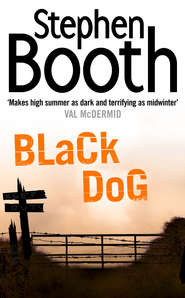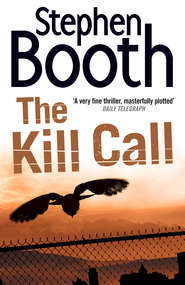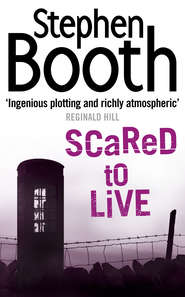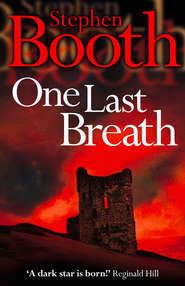По всем вопросам обращайтесь на: info@litportal.ru
(©) 2003-2024.
✖
Dying to Sin
Автор
Год написания книги
2019
Настройки чтения
Размер шрифта
Высота строк
Поля
‘Can you actually smell it?’ asked Cooper.
‘No. But, then, I think I’m getting a cold.’ Fry turned her face up to the drizzle that had started while they were speaking. ‘And if I stand out here much longer, it’ll be pneumonia.’
Fry sent Cooper to see if the DI needed anything doing before he went off duty. She shook her head as she watched him go, despairing at her inability to understand him, even now.
There were so many things about Cooper that bothered her. She was aggravated by his tendency to look hot and flustered, as if he’d only just got out of bed. These days, he’d probably been in bed with that SOCO, Liz Petty. Or maybe it was just the stress of running from one obsession to another. At least he didn’t look quite so dishevelled as he used to, so maybe he’d learned to wash and iron for himself since he moved out of the family farm into his little flat at Welbeck Street.
When she first met him, Fry had mostly been struck by that disarray and by his air of innocence, which was lacking in those around him. He looked as though he’d hardly left the sixth form at High Peak College. Now, she wasn’t so sure whether what she saw was innocence any more. For a start, his hair wasn’t quite so untidy. It no longer fell over his forehead, but had been styled. His tie still needed straightening, though, and that scuff mark had been on his leather jacket for months.
She looked up as Cooper’s car passed, catching his profile as he drove by. In retrospect, it was amazing that he’d ever seemed innocent at all.
Fry recalled the day he’d told her about his father, Sergeant Joe Cooper, and his death on the streets of Edendale at the hands of a gang of thugs. ‘Three of them got two years for manslaughter, the others were put on probation for affray. First-time offenders, you see. Of course, they were all drunk too.’ And then there had been his mother, the psychiatric illness and the complications that had taken her life only a few months ago, with Ben at her bedside in the nursing home.
Fry wanted to be fair to him, she really did. In the circumstances, she supposed it was surprising that Cooper still retained a positive outlook on life at all, let alone the concern he so often showed for the problems of other people. He ought to be cynical. He ought to have grown as cynical as she was herself. She wondered how he managed to avoid it.
Before she left Pity Wood, Fry took another look inside the inner cordon to see how work on the remains was progressing. Under the floodlights, the shadows of the diggers against the sides of the PVC tent. The body was emerging bit by bit, but it was a painstaking job.
Something dark and fibrous in the soil caught Fry’s attention. She couldn’t make out what it was at first. Then she realized it was a hank of black hair that had become detached from the head.
In a way, she found it more bearable when a corpse had started to decompose. At least it definitely looked dead. Fresh bodies were more disturbing, because they still had the look of life about them, as if they might spring up at any moment and carry on as normal. At those times, it was hard to be unaffected by the most distinctive things about a dead body – the coldness, the utter stillness, and the knowledge that a human life had just been snuffed out an hour, or even a few minutes, before you arrived.
In other ways, a body left in a shallow grave for years, undiscovered and unidentified, was the saddest sort of case. Somewhere, there must be family and friends, wondering even now what had happened to this woman.
Fry knew that hand would live in her memory for a while. It was bent into a gesture, welcoming, almost inviting. It was as if the dead woman was greeting her visitors, enticing them down into her grave.
She’d waited a long time to have company. And it must have been lonely down there.
6 (#uf6d6d0cd-8496-5b2a-9e54-a1361606c8cd)
Oh, I’m a man from a distant land,
A place where camels roam
It’s hot and flat, and dry as bone
And if they don’t like your face, they’ll cut off your hand
It’s the place that I call home!
The Pedlar turned to the chorus, who joined in with the song. They were all dressed as Chinese peasants – colourful tunics and coolie hats. Within minutes, the scene had shifted to the street outside Widow Twankey’s house, which meant the Emperor Ping Pong would soon arrive with his beautiful daughter.
Edendale’s Royal Theatre was full for the highlight event of the year, the annual Christmas pantomime. Ben Cooper was sitting several rows back from the stage, behind dozens of excited children waiting for the chance to boo and hiss and shout ‘Oh no, you didn’t’ at any opportunity.
There were many variations on the script for Aladdin, but Eden Valley Operatic Society seemed to have opted for one of the more politically incorrect versions. Not that there was such a thing as a politically correct Aladdin, with the characters of Wishy Washy and Inspector Chu of the Chinese Police Force. But he was particularly doubtful about Abdulla O’Reilly, listed in the programme as ‘an Irish half-wit’. And then there was Ugga-Wugga, chief of the cannibal tribe.
Cooper squirmed in his seat. Criminal investigations had been launched for less blatant examples of racist humour. But this was panto, and it was traditional. Surely no one came into the theatre without having a good idea what to expect? Cheap jokes, comic names, a cheerful confusion of racial stereotypes.
In the next seat, Liz nudged him and whispered. ‘Ben, have you had a think about coming to my parents’ on Christmas Day?’
‘No,’ hissed Cooper back.
‘No, you haven’t had a think? Or no, you’re not going to come?’
‘We’ll talk about it later.’
‘Oh, yes. You’re always so busy, though.’
A chorus of boos heralded the first arrival on stage of the wicked wizard, Abanazar. Within seconds, it was clear that he was being played pretty much as an evil Arab who’d accidentally wandered into a Chinese city. It certainly gave an extra edge to the lines of the opening song: ‘Andif they don’t like your face, they’ll cut off your hand.’
Cooper settled a bit lower on his seat, hoping not to be recognized. Some hopes. He’d already been greeted by a dozen acquaintances as he came through the lobby.
Liz nudged him again. ‘What’s the matter?’
‘Nothing.’
‘You look shifty.’
‘Thanks.’
‘Aren’t you enjoying it?’
‘Yes, it’s great.’
‘Only, we can’t leave. Not until after my friends have been on for their bit. They’re Chinese policemen, and they don’t appear until halfway through Act Two.’
Oh, God. The Chinese policemen. There were bound to be a few bobby jokes, and people would be looking at him when they laughed.
‘No, I’m fine, I don’t want to leave. Stop talking, or people will get annoyed with us.’
Every panto had its stock characters. There was always a very obvious villain – in this case, Abanazar, who had a large and challenging role, especially if he was going to carry off that turban and scimitar convincingly. And, of course, there was the pantomime dame. This Widow Twankey ran a Chinese laundry in the time-honoured way, allowing for the usual hoary old jokes about being closed for sock-taking, and so on.
Cooper turned to his programme, squinting to read the print in the subdued light of the theatre. Many of the names of the cast were familiar to him. If he didn’t know the performers themselves, he’d often come across their parents. Or, in the case of the children’s chorus, their grandparents. But most of them were individuals he’d made contact with in a positive way. Pantomime seemed to attract the respectable classes.
‘What are you thinking about, Ben?’
‘Nothing,’ he whispered. ‘I’m just looking at the programme.’
‘You’re not thinking about work?’
‘No, of course not.’
‘No “of course” about it. I know you.’
Reading down the list, Cooper found the names of the Chinese police officers. Apart from Inspector Chu, the performers were women. Their names were all local, too – Beeley, Holmes, Wragg, Marsden, Brindley. The latter was probably related to the actor playing Abanazar, since they had the same surname. He wasn’t sure which of them he was supposed to be watching out for.
‘Liz, what are your friends called again?’
‘Cheryl Hague and Harriet Marsden.’











